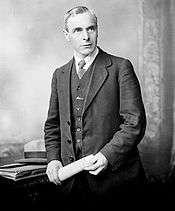Thomas Johnson (Irish politician)
| Thomas Johnson | |
|---|---|
 | |
| Teachta Dála | |
|
In office 1922–1927 | |
| Constituency | Dublin County |
| Senator | |
|
In office 1928–1934 | |
| Leader of the Labour Party | |
|
In office 1917–1927 | |
| Preceded by | James Connolly |
| Succeeded by | Thomas J. O'Connell |
| Personal details | |
| Born |
17 May 1872 Liverpool, England |
| Died | 17 January 1963 (aged 90) |
| Nationality | Irish |
| Occupation | Trade union leader |
Thomas Ryder Johnson (17 May 1872 – 17 January 1963) was an Irish nationalist politician, trade unionist and leader of the Irish Labour Party, who served as a Teachta Dála (TD) for Dublin County from 1922 to 1927.[1]
Born in Liverpool, Tom Johnson worked on the docks for an Irish fish merchant. It was here that he picked up ideas about socialism and Irish nationalism. Johnson moved to Ireland in the 1890s when he became involved in trade union and labour politics. In 1900 he started work as a commercial traveler. At various times he was the president, treasurer and secretary of the Irish Trade Union Congress which was, at that time, also the Labour Party in Ireland,[2] until officially founded in 1912 by James Connolly and James Larkin. Johnson became Vice-president of TUC in 1913, and President in 1915. Johnson sympathized with the Irish Volunteers, many of whom were sacked from their jobs, for illegal activities. During the Easter rising, he noted in his diary that people in Ireland paid little heed to the fate of the defeated revolutionaries.[3]
He succeeded as leader of the Labour Party from 1917, when the party did not contest the 1918 general election. When the British government tried to enforce conscription in Ireland in 1918, Johnson led a successful strike in conjunction with Sinn Féin that caused King George V to advise Lloyd George to drop the issue.
He was subsequently elected a TD for Dublin County to the Third Dáil at the 1922 general election and remained leader of the Labour Party until 1927.[4] As such, he was Leader of the Opposition in the Dáil of the Irish Free State, as the anti-treaty faction of Sinn Féin refused to recognise the Dáil as constituted. He issued a statement of support for the Government of the 4th Dáil when the Army Mutiny threatened civilian control in March 1924.[5]
Johnson is the only Leader of the Opposition from the Labour Party, or indeed from any party other than Fianna Fáil or Fine Gael. He lost his Dáil seat at the September 1927 general election, and the following year he was elected to Seanad Éireann, where he served until the Seanad's abolition in 1936.
Each Summer, Labour Youth holds the "Tom Johnson Summer School" to host panel discussions, debates and workshops.
Further reading
- Gaughan, John Anthony,Thomas Johnson, 1872–1963, (Mount Merrion 1980), ISBN 0-9506015-3-5
- 'Johnson's diary of Easter week, in J.A.Gaughan, Thomas Johnson, 1872-1963 (Mount Merrion 1980)
References
- ↑ "Mr. Thomas Johnson". Oireachtas Members Database. Retrieved 22 April 2011.
- ↑ UCD Library Archives, Thomas Johnson
- ↑ J A Gaughan, p.50, as cited by Townshend, "Easter 1916", p.257.
- ↑ "Thomas Johnson". ElectionsIreland.org. Retrieved 22 April 2011.
- ↑ "The Irish Mutiny. New Commander Of Free State Forces". The Times. 11 March 1924.
| Oireachtas | ||
|---|---|---|
| Preceded by Séamus Dwyer (Sinn Féin) |
Labour Party Teachta Dála for Dublin County 1922–1927 |
Succeeded by Joseph Murphy (Ind) |
| Party political offices | ||
| New title | Leader of the Opposition 1922–1927 |
Succeeded by Éamon de Valera |
| Preceded by James Connolly |
Leader of the Labour Party 1917–1927 |
Succeeded by Thomas J. O'Connell |
| Political offices | ||
| Preceded by James Larkin |
President of the Irish Trade Union Congress 1916 |
Succeeded by Thomas MacPartlin |
| Preceded by David Robb Campbell |
Treasurer of the Irish Trade Union Congress 1919–1920 |
Succeeded by William X. O'Brien |
| Preceded by Cathal O'Shannon |
General Secretary of the Irish Trades Union Congress 1945 |
Succeeded by Ruaidhri Roberts |